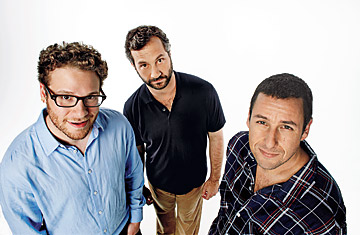
Portrait of Seth Rogen, Judd Apatow, and Adam Sandler.
(5 of 6)
The thing about the people Apatow mentors is that they're all men. His films are about men growing up and men helping men grow up and men being just shy of gay as they tease one another about being gay as they help one another grow up. There are smart, successful women in the movies, but other than his wife, they never join the troupe. "We're all really uncomfortable around girls, for the most part," says Rogen. "I imagine that has something to do with it." This annoys a lot of critics, male and female, as well as some viewers, but Apatow insists the female roles in his movies are just as real as the male ones. He's producing films written by and starring Kristen Wiig and Charlyne Yi; if those movies have lots of women calling one another lesbians and making self-deprecating vagina jokes, then Apatow can check off one more box on his self-improvement list.
All his characters, after all, strive to be better people. "There's a thread going all the way from Freaks and Geeks to Funny People," says Shandling, for whom Apatow worked as a writer on The Larry Sanders Show in the mid-'90s. "That philosophy is, We're all doing the best we can in life. It isn't easy. It's just a little funnier than Buddha Buddhism." When I ask Apatow if he sees himself having a career like those of two filmmakers known for the dramedy mode--Woody Allen and James L. Brooks, who made Terms of Endearment and Broadcast News--he gets way more excited about the Brooks comparison. "Woody Allen isn't very hopeful about human beings," he says. "Jim Brooks is hopeful. He likes people."
Funny People is the first time he's put his philosophy front and center. The 40 Year-Old Virgin was an idea Steve Carell had from doing improv. Knocked Up drew on Apatow's experiences of becoming a father, but it borrowed heavily from Rogen's foulmouthed stoner worldview. This was the knock against Apatow, which he mocked in a famous heated e-mail exchange with Mark Brazill, a co-creator of That '70s Show, who accused him of stealing one of his ideas for a Ben Stiller Show sketch and then wished cancer on him. Apatow wrote, "As for the cancer, I'll wait till you get it and then steal it from you. By the way, that joke was one of my writers', Rodney Rothman (see, I credited him)." When Apatow asks me how I'm doing with this article and I tell him I've been stymied by laziness, he sends me an e-mail that reads, "The reason you are having trouble is the same reason why I quit stand-up--I am not that interesting."
But in Funny People his life gets some screen time. The movie starts with 20-year-old clips Apatow shot of Sandler, his then roommate, making prank calls. "It was like the old days when we lived together, except my trailer smelled better," Sandler says. The story is about an experience with a friend's sickness that Apatow, usually so open about his life, refuses to talk about. In the movie he has something very clear to say, which in its Shel Silverstein essence is that happiness comes from selflessness and living in the present, not from burying yourself in work.
